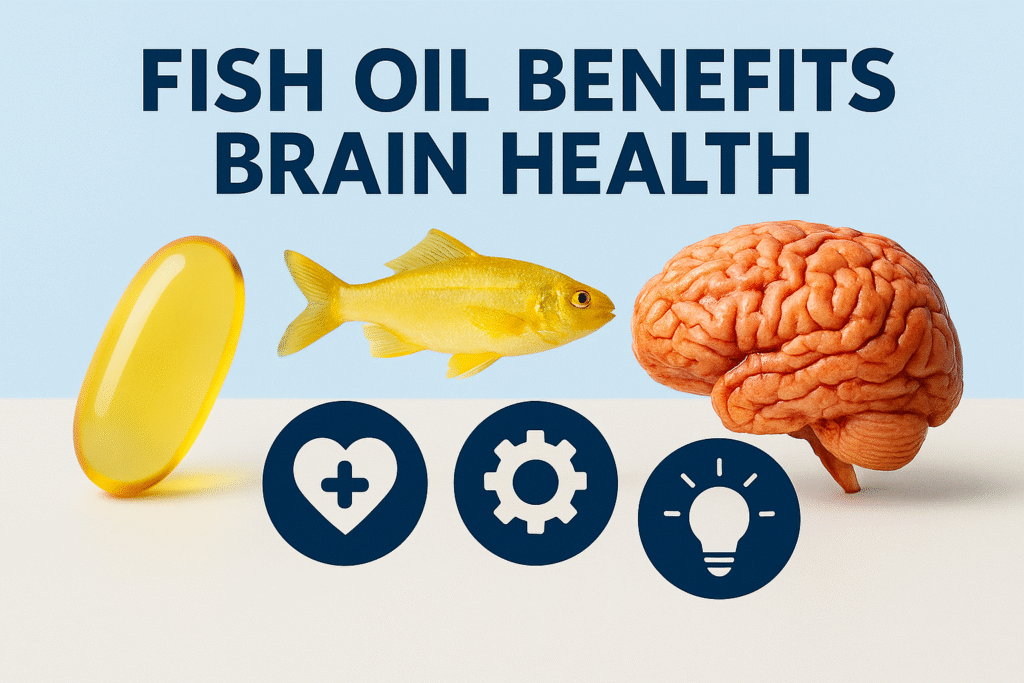As an Amazon Associate, I earn from qualifying Purchases.

Introduction
Fish oil has long been touted as a super supplement, largely because of its high content of omega-3 fatty acids. But beyond general wellness, one of the most profound benefits of fish oil is its positive impact on brain health. Fish oil plays a critical role in our neurological well-being. It supports cognitive development in infants. It prevents cognitive decline in older adults.
This article explores the science, benefits, recommended dosages, and potential side effects of fish oil for brain health.
What Is Fish Oil?
Fish oil is derived from the tissues of oily fish, like mackerel, salmon, tuna, sardines, and anchovies. It’s rich in omega-3 fatty acids, particularly:
- EPA (Eicosapentaenoic Acid)
- DOHA (Docosahexaenoic Acid)
These fatty acids are considered essential. This means your body can’t make them on its own. You have to get them from your diet or supplements.
The Brain and Omega-3 Fatty Acids
Your brain is nearly 60% fat, and a significant part of this fat is DHA. This fatty acid is essential for the structural integrity of brain cells. EPA is less abundant in the brain. Nonetheless, it plays a vital role in reducing inflammation. Inflammation is a key contributor to many neurological conditions.
Key Benefits of Fish Oil for Brain Health
1. Cognitive Development in Infants and Children
- Prenatal Benefits: DHA is crucial for the development of the fetal brain and retina. Pregnant women who supplement with fish oil often have children with better hand-eye coordination and higher IQ scores.
- Postnatal Growth: Supplementing infants with DHA enhances cognitive development, particularly in the first two years of life.
- Childhood Behavior and Learning: Omega-3s have shown potential in managing ADHD. They can also help improve focus. Additionally, they enhance reading skills and memory in school-aged children.
2. Mental Health and Mood Stabilization
- Depression: Studies show a link between low omega-3 levels and depression. Fish oil supplementation, particularly with higher EPA content, has demonstrated effectiveness in reducing symptoms of depression.
- Anxiety: Regular intake of fish oil helps reduce anxiety symptoms by balancing brain chemicals and reducing inflammation.
- Bipolar Disorder & Schizophrenia: Some research suggests that fish oil supports mood stability. It also reduces the frequency of episodes. Nevertheless, it’s not a standalone treatment.
3. Memory and Learning
- Short-Term Memory: DHA supports the function of the hippocampus, the area of the brain responsible for memory.
- Long-Term Cognitive Function: Several studies suggest that people who consume fish oil regularly perform better on memory and learning tests.
4. Protection Against Cognitive Decline and Alzheimer’s Disease
- Age-Related Cognitive Decline: Fish oil slows cognitive decline in older adults, especially when started before signs of impairment start.
- Alzheimer’s Prevention: While results are mixed, there is some evidence that fish oil can delay the onset of Alzheimer’s. It may also reduce the risk, particularly when taken early.
5. Stroke and Brain Injury Recovery
- Fish oil has neuroprotective properties that may aid in recovery after stroke or brain injury. It can support the repair of damaged neurons and improve cognitive and motor function.
Scientific Research Supporting Brain Benefits
Study #1 – Harvard Medical School (2010)
A study published in the American Journal of Clinical Nutrition discovered a significant finding. Individuals with higher levels of DHA had a 47% lower risk of developing dementia.
Study #2 – Journal of Clinical Psychiatry (2011)
This meta-analysis found that EPA-rich fish oil supplements were effective in treating major depressive disorder.
Study #3 – Alzheimer’s Research & Therapy (2014)
Researchers found that individuals who took fish oil had significantly less brain shrinkage and better cognitive performance over time.
Study #4 – Pediatrics (2005)
Infants fed DHA-fortified formula showed significantly higher IQ scores at age four compared to those who were not.
Mechanisms: How Fish Oil Improves Brain Function
Neurogenesis
Fish oil stimulates the production of new brain cells, especially in the hippocampus, a region vital for learning and memory.
Anti-Inflammatory Effects
Chronic brain inflammation is linked to depression, dementia, and other conditions. EPA in fish oil helps reduce this inflammation.
Cell Membrane Fluidity
DHA maintains the fluidity of brain cell membranes, which enhances communication between neurons and neurotransmitter function.
Neurotransmitter Support
Omega-3s improve the functioning of dopamine and serotonin, key mood-regulating neurotransmitters.
Recommended Dosages for Brain Health
| Age Group | Recommended Omega-3 (EPA + DHA) | Notes |
|---|---|---|
| Infants (0–12 mo) | ~500 mg/day (mainly DHA) | Through breastmilk or formula |
| Children (1–8 yr) | 250–500 mg/day | Focus on DHA-rich sources |
| Adults | 1000–2000 mg/day | Combination of EPA + DHA |
| Seniors (65+) | 2000 mg/day | To protect against decline |
| Pregnant Women | 1000 mg/day (min 200mg DHA) | For fetal brain development |
Tip: Always choose molecularly distilled fish oil to avoid mercury and other toxins.
Types of Fish Oil Supplements
- Triglyceride Form: More natural and better absorbed.
- Ethyl Ester Form: More concentrated but slightly harder to absorb.
- Phospholipid Form (Krill Oil): Excellent absorption and antioxidant properties.
Food Sources of Omega-3 for Brain Health
| Food | Omega-3 Content (per 100g) |
|---|---|
| Mackerel | 5,134 mg |
| Salmon | 2,260 mg |
| Sardines | 1,480 mg |
| Anchovies | 2,113 mg |
| Chia Seeds (ALA) | 4,915 mg |
| Flaxseeds (ALA) | 2,350 mg |
| Walnuts (ALA) | 2,570 mg |
Note: ALA from plant sources must be converted to DHA/EPA, which is less efficient in the human body.
Potential Side Effects and Risks
Though generally safe, fish oil supplements can cause:
- Nausea
- Fishy aftertaste or burps
- Loose stools
- Interactions with blood thinners
Precaution: Always consult a healthcare provider if you’re on medication or have chronic health conditions.
Who Should Consider Fish Oil for Brain Health?
- Pregnant women
- Infants (via fortified formula or breastfeeding)
- Students under mental stress
- Adults with depression or anxiety
- Seniors concerned about cognitive decline
- Individuals recovering from stroke or TBI (under medical advice)
Plant-Based Alternatives
Not everyone consumes fish, but there are vegan options:
- Algal Oil: Extracted from algae, contains DHA and sometimes EPA.
- Flaxseed Oil: Contains ALA, which can be partially converted to DHA.
- Chia and Hemp Seeds: Good for general omega-3 intake.
Fish Oil and Brain Health in Special Populations
Athletes
Athletes may benefit from faster recovery and improved cognitive performance during training.
Students
Improved focus, reduced test anxiety, and better retention of information.
Tech Workers & Knowledge Professionals
Enhanced creativity, decision-making, and reduced mental fatigue.
FAQs About Fish Oil and Brain Health
Q1: Can fish oil make me smarter?
It may not increase IQ dramatically, but it can enhance memory, learning, and clarity.
Q2: How soon will I notice brain-related benefits?
It varies, but some people feel an improved mood and clarity within 4–6 weeks.
Q3: Can I take fish oil with antidepressants?
Often yes, but consult your doctor first.
Conclusion
Fish oil is one of the most researched and trusted supplements for brain health. Whether you’re looking to enhance cognitive development, improve mood, sharpen memory, or ward off age-related decline, omega-3 fatty acids from fish oil are a powerful ally.
Consistent, high-quality supplementation—combined with a healthy diet and lifestyle—can make a measurable difference in your mental performance and long-term brain health.
#FishOil #BrainHealth #Omega3 #DHA #EPA #MentalHealth #MemoryBoost #Neuroprotection #CognitiveFunction #HealthyAging #ChildDevelopment #MoodSupport #DepressionHelp #BrainSupplements #NaturalHealth
Fish oil plays a crucial role in supporting brain health by offering a range of benefits, such as cognitive enhancement, mood improvement, memory sharpening, and age-related decline prevention. To experience these advantages, it is recommended to consistently supplement with high-quality fish oil while maintaining a healthy lifestyle and diet. Omega-3 fatty acids from fish oil are proven to have a significant impact on mental performance and long-term brain health.
As an Amazon Associate, I earn from qualifying Purchases.
